How to Avoid Scams When Buying Gemstones
A Comprehensive Guide for Online and In-Person Shoppers
Whether you're purchasing gemstones online or visiting a physical store, the risk of scams is always present. The sparkle of gemstones like rubies, emeralds, and sapphires can sometimes overshadow the due diligence needed to ensure you're getting exactly what you're paying for. To help you navigate the complexities of gemstone shopping, this guide breaks down the steps for avoiding scams in both online and physical markets.
1. Do Your Research First

Before diving into any purchase, especially for something as valuable as gemstones, the first step is to educate yourself. Know the type of gemstone you're interested in, including its natural characteristics, common treatments, and price range.
- Example: Natural emeralds often have inclusions (internal flaws), and stones without them may be synthetic or heavily treated.
- Tip: Research gemstone certifications and grading standards to understand what influences the quality and value of the stone you're buying.
2. Buying Gemstones Online: What You Need to Know
Online shopping has opened up access to an incredible variety of gemstones from sellers around the world. However, this convenience comes with higher risks, as it's harder to verify the authenticity of the stones without seeing them in person. Here's how you can protect yourself:
a. Buy from Reputable Online Retailers
Choose online sellers who have established credibility in the gemstone market. Look for companies that offer detailed product descriptions, including clarity on the stone's origin, treatments, and certification. Trusted online platforms like Gandhara Gems provide complete transparency and customer reviews to verify the legitimacy of their offerings.
- Red Flags: If the seller’s website has little information about the gemstones or their policies, consider it a warning sign. Additionally, avoid websites that offer gemstones at steeply discounted prices without explanation.
b. Look for Certification

Online purchases should always come with certification from respected gemological labs like GIA, AGS, or IGI. These certificates verify the gemstone's identity and quality, providing peace of mind for online buyers who can't physically inspect the stone.
- Why it’s Important: Certification protects against buying fake stones or misrepresented gemstones. Ensure that the certificate is from a reputable lab and not just a document from the seller.
c. Check Return and Refund Policies
A reliable online seller will offer clear return and refund policies. This is especially important since you can’t inspect the gemstone in person before buying.
- No Return, No Deal: If an online seller doesn’t offer a return policy or makes it difficult to return items, proceed with caution. You should be able to return a stone if it doesn’t meet your expectations or match the seller’s description.
d. Read Customer Reviews

Customer reviews can provide valuable insight into the experiences of other buyers. Look for verified reviews and testimonials that discuss the quality of the gemstones, the accuracy of product descriptions, and customer service.
- Tip: Look beyond star ratings—pay attention to detailed comments about the authenticity and service quality.
e. Secure Payment Methods
Use secure payment methods like credit cards or PayPal, which offer buyer protection. Avoid wire transfers or methods that don’t provide an easy way to dispute charges in case something goes wrong.
3. Buying Gemstones in Physical Stores: What to Watch Out For
Buying gemstones in person allows you to closely inspect the stones, but it also requires attention to detail and the ability to discern a gemstone's authenticity. Here’s how to approach in-store purchases:
a. Visit Reputable Jewelers
Just as with online shopping, the reputation of the jeweler is crucial. Seek out established jewelry stores with positive reviews and a long-standing reputation in the market.
- Why it Matters: Trusted jewelers often have certified gemologists on staff, ensuring that what you're buying is legitimate and fairly priced.
b. Examine the Gemstone Closely
When buying in person, take advantage of being able to physically inspect the gemstone. Use proper lighting and a magnifying glass to look for imperfections, color variations, and other key characteristics of the stone.
- Inclusions: Most natural gemstones have inclusions, so a flawless appearance could mean the stone is synthetic or treated.
- Color: Genuine gemstones often exhibit slight variations in color, while fake or heavily treated stones may appear unnaturally perfect.
c. Ask for Certification and Documentation
Always ask for certification from an independent gemological laboratory, even when buying in person. The seller should be able to provide documentation that proves the gemstone's authenticity, treatments, and quality grade.
- Trusted Labs: Insist on certificates from recognized labs like GIA or AGS. If the seller can’t provide this, consider it a red flag.
d. Beware of High-Pressure Sales Tactics
In-store sellers may try to rush you into a purchase, particularly if they’re trying to offload lower-quality or fake gemstones. Don’t let anyone pressure you into buying on the spot—take your time to inspect the gemstone and make an informed decision.
- Tip: A trustworthy jeweler will be happy to let you take your time and will provide all the necessary information without hesitation.
e. Compare Prices

Visit several stores and compare prices for similar gemstones. If one store’s price seems significantly lower than the others, it could be a sign of inferior quality or a counterfeit stone.
4. Common Scams to Watch For
Whether you’re buying online or in person, be on the lookout for these common scams:
- Doublets and Triplets: Stones made by bonding multiple layers of different materials to simulate a solid gemstone.
- Misrepresented Stones: Sellers may mislabel gemstones, such as passing off a spinel as a ruby.
- Glass-Filled Stones: Some stones are filled with glass to improve their appearance but are worth far less than their untreated counterparts.
5. Ask for a Second Opinion

If you’re unsure about the gemstone’s authenticity, consider having it examined by an independent gemologist. This can help verify that what you're buying is legitimate and worth the asking price.
Conclusion: Trust Your Source

Purchasing gemstones can be a rewarding experience, whether you're shopping online or visiting a store. By following these guidelines—doing your research, buying from reputable sources, insisting on certification, and knowing the common scams—you can avoid being deceived and ensure your gemstone is genuine. Remember, your purchase is an investment, and it’s worth taking the time to get it right.
For a completely worry-free experience, visit Gandhara Gems at gandharagems.com. We are a trusted source for premium, authentic gemstones and guarantee that what you see is what you get. All our stones come with certification, and we offer free international shipping on orders over $120. Shop confidently, knowing you're buying quality gemstones that will shine for a lifetime.
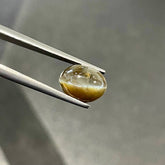
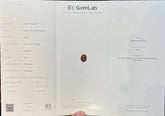
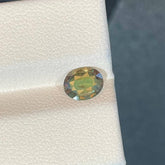
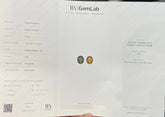
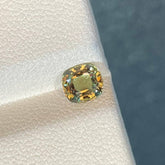

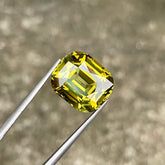
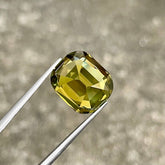
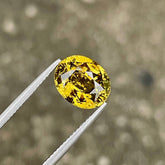
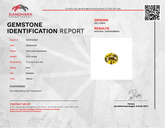


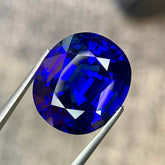

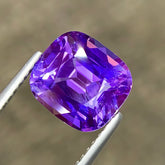

Leave a comment
Please note, comments need to be approved before they are published.